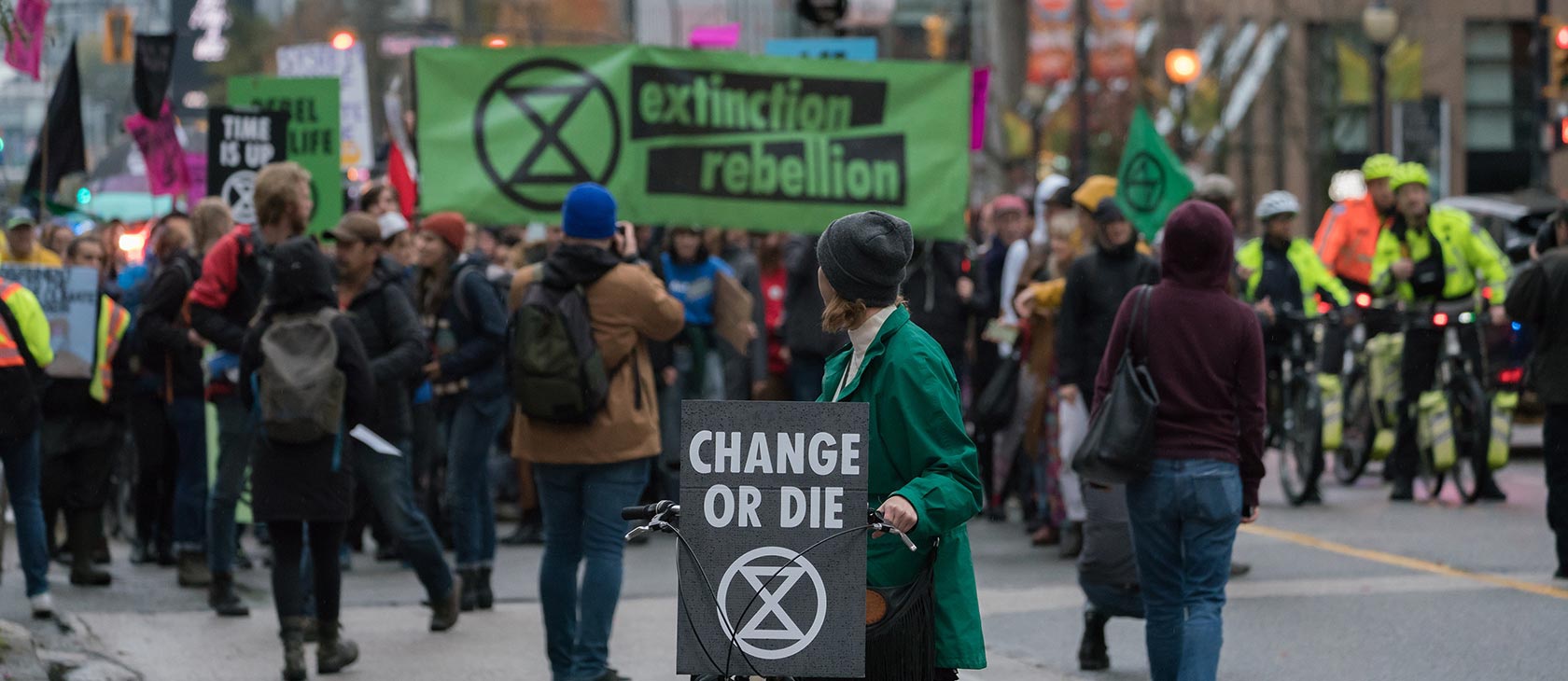Getting serious about climate and conservation.
The apocalyptic, “end of the world” story is a staple of popular culture. There seems to be an unlimited appetite for the quasi-religious unveiling (ἡ ἀποκάλυψις in the Greek) of humanity’s inexorable doom and hellish end. Maybe part of that appeal is the mainstreaming of science fiction, once a pulp subgenre and available now wherever movies, videos, and books are digitally streamed. Or maybe the culture is just mired in childish fantasies.
“The popular appetite for spectacle in the form of natural disaster and human calamity is a major impetus for the production of shallow apocalyptic fiction in every medium,” writes scholar Lorenzo DiTommaso. “This shallowness speaks to the issue of popular appeal, for at its core, apocalypticism is an adolescent worldview. It describes the world in uncomplicated terms of good and evil, offers simplistic responses to complex problems, and places responsibility for solving these problems elsewhere.”
Doomsayers of a climate apocalypse
That’s also a good description of some corners of environmental activism, and projects such as the Green New Deal, with its plans to abolish fossil fuels and deindustrialize the U.S. economy (itself a melding of sci-fi and fantasy) to achieve arbitrary de-carbonization benchmarks. (In truth, it’s really a “how-do-you-change-the-entire-economy thing, ” admitted Congresswoman Alexandria Ocasio-Cortez’s former chief of staff, Saikat Chakrabarti.) We have only 12 years to ward off catastrophe, says Rep. Ocasio-Cortez, or “the world is going to end.” Unwittingly, she has contributed yet another failed prediction of doom to the long running list compiled by the political Right.
Real adolescents have been enlisted in the fight to remake reality. Out of nowhere, 16-year-old Greta Thunberg emerged in 2019 at the forefront of a media-driven campaign to convince the world that teenagers skipping school for a “climate strike” will get adults to “unite behind the science” and do as they’re told.
“People are suffering, ”Thunberg said at a UN conference in September. “People are dying. Entire ecosystems are collapsing. We are in the beginning of a mass extinction. And all you can talk about is money and fairytales of eternal economic growth. How dare you!”
Apocalypticism is an adolescent worldview. It ... offers simplistic responses to complex problems, and places responsibility for solving these problems elsewhere.
But perhaps nowhere are the adolescent fantasies of environmental apocalypse – and the sort of high-certitude, simplistic responses to life’s problems commonly heard from teenagers – more pronounced than in the Extinction Rebellion phenomenon. It aims for a net-zero emissions economy by 2025, five years ahead of Ocasio-Cortez’s plan. “XR” is known for disrupting or shutting down roads and public transport in major cities worldwide. Never mind that the great mass of humanity is trying to get to work, pay their bills, take care of their families, and “keep the fairytales of eternal economic growth” chugging along. (See this entertaining video of London commuters turning on protestors who have stopped a train.
XR wants “governments to accede to a key demand: creating a citizen’s assembly that accelerates society away from climate-destroying industries.” It aims for a “tipping point” of 3.5 percent of the population mobilized and eager to sweep away the slow-moving deliberations of democracies that obstruct our net-zero future. “We do not trust our government to make the bold, swift, and long-term changes necessary to achieve these changes, and we do not intend to hand further power to our politicians, ” XR announces.
XR isn’t saying when its citizen’s assembly will hand back the levers of power to democratically elected governments. Its political theorists cite the toppling of repressive regimes – Milosevic in Serbia and Marcos in the Philippines – as evidence that a highly committed cadre can effect change. The group might also have cited the relatively small numbers of Bolsheviks and Mensheviks in Russia in 1910 (fewer than 100,000 in a nation of some 125 million).
Religious climate alarmism
Regrettably, too many religious leaders have bought into the apocalyptic hysteria and urgent demands for sweeping, top-down solutions. Their moral influence is too often indistinguishable from the political Left, which demands state intervention and sees capitalism and consumerism as despoiling the natural environment.
In 2017, Ecumenical Patriarch Bartholomew and Pope Francis issued a joint declaration – a “Prayer for Creation” – decrying humanity’s “propensity to interrupt the world’s delicate and balanced ecosystems, our insatiable desire to manipulate and control the planet’s limited resources, and our greed for limitless profit in markets – all these have alienated us from the original purpose of creation. We no longer respect nature as a shared gift; instead, we regard it as a private possession. We no longer associate with nature in order to sustain it; instead, we lord over it to support our own constructs.”
Typically, Bartholomew and Francis have focused on “magical solutions” – stumping for unenforceable international treaties that would do next to nothing to improve the climate – which are not only unfeasible politically but misstate the nature of the problem. A decade ago, Roger Pielke, author of The Climate Fix: What Scientists and Politicians Won’t Tell you about Global Warming (2010, Basic Books), pointed out that these sorts of pronouncements are really just for show. “Symbolism is of course an essential part of politics, but when it becomes detached from reality – or even worse, used to exclude consideration of realistic proposals – the inevitable outcome is that policies will likely fail to achieve the promised ends, ” he wrote. “This outcome is highly problematic for those who actually care about the substance of climate policy proposals.”
More recently, Pielke analyzed the U.S. energy mix and showed that the growth of renewable energy was simply an addition to what we’re already using. Fossil fuels were not displaced; there was only a shift to natural gas as a replacement for coal. “The U.S. has not yet begun its journey towards net-zero carbon dioxide, whether by 2050 or any other year, ”he concluded. “None of the proposals put forward by Democratic candidates for president are plausible. This battle has yet to be joined.”
The tone-deaf scolding by religious leaders like Bartholomew and Francis is not only an exercise in magical thinking, it also ignores the contributions of millions of their own parishioners in churches around the world who would describe themselves as environmentalists or conservationists. People who care about the environment, and the places they love, roll up their sleeves and get to work.
The conservative case for constructive conservation
Attitudes are shifting toward a more positive engagement on the political Right, with organizations like ConservAmerica and the American Conservation Coalition. This past summer, a group of GOP senators and congressmen formed the Roosevelt Conservation Caucus to restore the party’s credibility on environmental and conservation issues (and to counter the Green New Deal).
While public opinion sentiments on climate change are most pitched on the Left, younger GOP voters are joining them. Talk to conservatives who are active in environmental work, and they will often say things like, “Who doesn’t believe climate change is real?” This despite a healthy skepticism of a debate that is utterly polarized. In their 2015 article “Conservatives and Climate Change, ”Jim Manzi and Peter Wehner said it was not enough to stake out a position of neutrality on climate science.
Scientific ignorance is not an excuse for refusing to stake out a position
“Scientific ignorance is not an excuse for refusing to stake out a position,” they wrote. “Politicians rely on engineers to help them figure out which bridges are worth building, on physicists to suggest which defense projects are most feasible, and on biologists to better understand the threat of Ebola or Swine Flu. There is no reason why climate change should be different.”
Why not embrace policies and practices that focus on climate mitigation and adaption, and concrete and practical actions at the ground level that have the potential to make things better? It’s a bet on the future, where there is no room for fatalism or despair.
Here’s what that looks like. The Property and Environment Research Center in Bozeman, Montana, has collected dozens of case studies of market-based entrepreneurial approaches to preserve wildlife habitats and address pollution problems. The stories show how individual initiative and broad civic participation can solve knotty problems. To cite just one example, an “enviropreneur” in New Hampshire named Brett Howell was troubled by the death of loons that ingested fishing tackle made of lead. He worked with the Loon Preservation Committee and the New Hampshire Fish and Game Department to set up a tackle buyback program. Anglers who turned in at least an ounce of lead tackle received a $10 gift certificate to purchase non-toxic alternatives at partner shops. The program removed more than 3,000 pieces of lead tackle from state waters, providing a safer habitat for loons, according to PERC.
In his 2012 book How to Think Seriously About the Planet: The Case for Environmental Conservatism, philosopher Roger Scruton argued that none of the treaty-based, globalist environmental programs put forth by the political Left have a hope of succeeding if they are not rooted in individual or civic action. “Environmental problems must be addressed by all of us in our everyday circumstances, and should not be confiscated by the state,” he writes. “Their solution is possible only if people are motivated to confront them, and the task of government is to create those conditions in which the right kind of motive can emerge and solidify.”
To describe these grassroots motives, Scruton coined the word oikophilia (pronounced ECO-philia), or “the love and feeling for home.” The state, he writes, should “make room” for these ground-up efforts, although Scruton’s careful not to demonize every government conservation program. He’s for exploring “the ways in which rational beings can reach co-operative solutions to problems that cannot be addressed either by the individual or the centralized state.”
Scruton defends “initiatives against global schemes, civil association against political activism, and small-scale institutions of friendship against large-scale and purpose-driven campaigns.” On climate change, Scruton describes its appeal partly due to the ability to “internationalize” the problem and present a “calamity so great” that nothing in the way of everyday solutions will do. “The only feasible response to the threat of global warming is to devote our resources to how we might produce energy cheaply and renewably, and then making those discoveries available around the world.”
The collaborative power of "discerning environmentalism"
It’s not just conservatives who are working on reasonable approaches. The practical progressives at the Breakthrough Institute hope to create cooler, more reasoned debates. Tisha Schuller, an environmentalist who went to work for the oil and gas industry, observed in the Winter 2018 edition of Breakthrough Journal that she understands the anti-environmentalist attitudes of many people. “But vilifying environmentalists is no way to live, ” she writes. “No one gets to corner the market on loving the outdoors, wanting to protect special places, and taking solace and refreshment in nature.”
Yes, there may be “wildly different ways” of going at it. But most everyone, she says, “want[s] the same things – a reasonable quality of life, the opportunity to improve our circumstances, and access to beautiful, healthy, natural environments.”
A “discerning environmentalism” as she describes it, “requires that we let go of some traditional positions that don’t stand up to scrutiny, honestly assess trade-offs, and seek the best energy solutions, and make environmental values available to people of every political, socioeconomic, and cultural persuasion.”
This sounds eminently reasonable. And it puts the apocalyptic scenarios and frightful doomsayers in the place where they belong: harmlessly relegated to the screens of dystopian Hollywood blockbusters.




